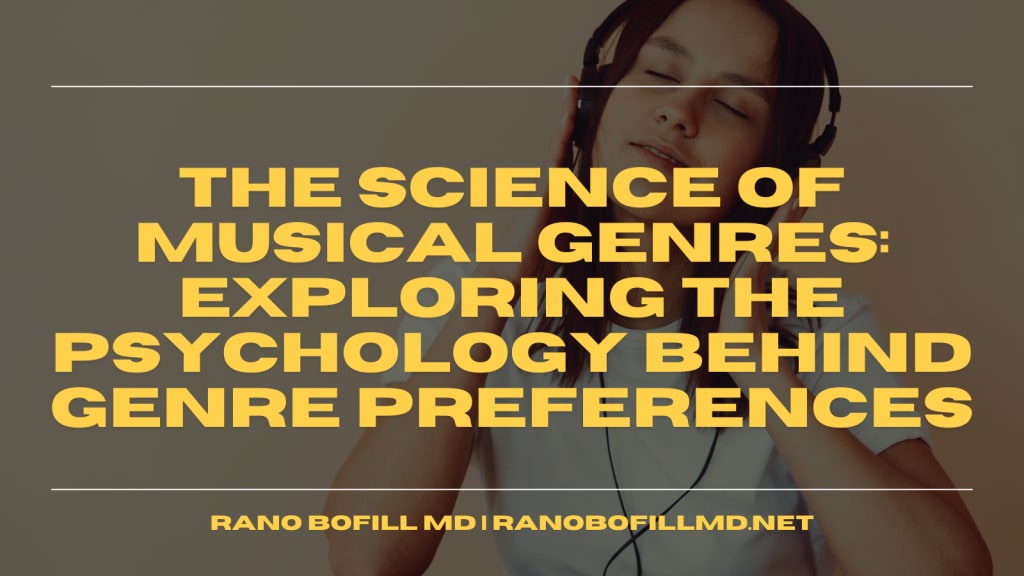The Science of Musical Genres: Exploring the Psychology Behind Genre Preferences
by Rano Bofill

Music is a common language that people from all cultures can understand, and it can make listeners emotional, remind them of good times, and establish personal connections. Music is a fascinating art all by itself, and it has all the different genres that are unique in their own special way. The music genre types are as numerous as the fans, and there is no doubt that everyone can find something that corresponds to their very own taste. However, what causes these tastes to be difficult to define? One must explore the role psychological factors play in understanding someone's attraction to jazz instead of pop or rock instead of electronic music. We will be looking into the science of the music genre and the psychology that underlies what makes us prefer one genre to another.
The Role of Emotions in Genre Preferences
A subject of music taste is the emotional waves that music brings about. Studies have revealed how different rhythms and melodies can create various emotions. As an example of the effect getting into specifics, classical music often makes us calm and relaxed, whereas pop music with a good beat can make us happy and cheerful. The psychological phenomenon of empathic contagion explains that music of the same or opposite emotional value as we can be appealing. This tendency sometimes makes people under stress opt for soothing genres, such as ambient or classical music, for comfort and relaxation.
Cognitive Processing and Musical Complexity
Another variable that decides the type of music a person listens to is cognitive processing and musical complexity. For some listeners, it can be tunes, harmony complexities, and a high level of proficiency that captivate them and lead to the preference for genres such as progressive rock or jazz fusion. While some people may be looking for depth and structure, others might be into simple and catchy hooks that are often found in pop or mainstream songs. This choice depends on the cognitive styles of individuals who like the difficulty of decoding complex musical structures, while other people are more likely to favor the straightforward and easy-to-grasp kind of songs.
Social Influences and Cultural Identity
Our choices in music are also due to the social environment and cultural heritage we find ourselves in. The background of the family, groups of friends, and culture to which we belong greatly influence the range of genres that we have access to and like. Such an individual who was brought up in a family in which classical music was valued could eventually develop a deep respect for orchestral compositions. Furthermore, some people may listen to music their friends listen to. For example, individuals who are surrounded by friends who listen to hip-hop or electronic dance music genre may adopt these genres as part of their musical identity. Social interactions and cultural contexts are the chairs on which musical preferences are built, and individuals connect with their communities through the same thread of music.
Psychological Influence of Lyrics and Themes
Lyrics, songs' meaning, and mood influence the choice of genre since they reflect personal stories, feelings, and life experiences. Likewise, fans of folk or singer-songwriter genres usually look for storytelling and lyrics that express something meaningful and personal and address societal problems. However, dance music lovers might value the catchy and infectious rhythms rather than lyrical components. The psychological meaning of lyrics is in their potential to arouse empathy, introspection, and a feeling of compartmentalization with the artist's story.
Individual Differences and Personalization
Theic tastes are highly individualized as they result from the interaction of psychological, cultural, and experiential factors. A listener may be inclined to a diverse spectrum of genres, whereas others may listen to a specific genre based on life experiences, memories, and associations. Recognizing the emotional nature of genre preferences enables music lovers to enjoy the various musical styles and continue to expand their understanding of the different genres and styles.
The study of musical genres offers insight into the intricate interactions between psychological elements that influence our tastes and feelings when listening to music. Our musical preferences reflect our individual identities and experiences, from the function of emotions and cognitive processing to social influences and lyrical significance. By investigating the psychology underlying genre preferences, we can better understand music's profound influence on our thoughts, feelings, and sense of belonging in the world of musical expression.
About the Creator
Rano Bofill, MD
Rano Bofill M.D. is a compassionate healthcare professional, Radiologist, public servant, and musician who has dedicated his life and his career to the service of others!






Comments
There are no comments for this story
Be the first to respond and start the conversation.